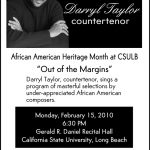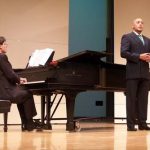Countertenor Darryl Taylor was our guest on February 15, 2010 at California State University Long Beach. For more information on Dr. Taylor, please visit his website –http://www.DarrylTaylor.com
Out of the Margins Program
Darryl Taylor, countertenor
Lukas Swidzinski, piano
Darryl Taylor, countertenor sings a program of masterful selections by under appreciated African American composers. This lively program simultaneously emphasizes the legitimacy of African American song while embracing the countertenor voice, underscoring the relevance and vitality of the fach.
| Program | |
|---|---|
| The Bereaved Maid | George Walker |
| Death of Bessie Smith | Mark Fax |
| A Death Song | Howard Swanson |
| Joy | Howard Swanson |
| Bronte Lieder (Emily Bronte) | Robert Owens |
| The Old Stoic | |
| Tell Me, Tell Me | |
| Sleep brings no joy to me | |
| Creole Girl | H. Leslie Adams |
| Sence you went away | |
| Prayer | |
| For you there is no song | |
| Amazing Grace | |
| Mary Wore Three Links of Chain | arr. George Walker |
| This may be my las’ time | arr. Robert Morris |
| Guide My Feet | arr. Jacqueline Hairston |
Long Beach Press-Telegram Coverage
By Greg Mellen, Staff Writer
Long Beach Press-Telegram
Posted: 02/13/2010
LONG BEACH — This week, in conjunction with several African-American Heritage Month events, two very different styles of music will be performed. On Monday, countertenor Darryl Taylor will present a show featuring selected pieces from under-represented African-American composers at Cal State Long Beach. And on Thursday at Long Beach City College, a couple of “roots” performers, poet Sufia Giza and reggae veteran Claudius Linton, will play an outdoor concert. The idea of presenting two divergent forms of African-American music was intentional, according to John Malveaux, who helped broker the events.
Taylor’s performance, at 6:30 p.m. at the Gerald Daniel Recital Hall at Cal State Long Beach, will feature a wide range of music from arrangements of Negro spirituals, such as ‘Guide My Feet,’ as well as work by trailblazer George Walker, the first African-American composer to win the Pulitzer Prize for music in 1996. According to Taylor, black composers are producing world-class music that “gets neglected or relegated to one or two scant performances that are not done well.” Similarly, Taylor’s countertenor voice is often relegated to baroque music, none of which is in his show.
“Black composers don’t want to be identified by race but by the excellence of their work,” Taylor says. And his show is meant to not only display that excellence, but a variety of styles that go beyond race. “Ultimately, the idea the that humanity is diverse – deliciously diverse,” he says. Taylor brings a wide repertoire of experience and styles, including classical, opera, jazz and gospel. He is also an academic and lectures on music and is on the faculty at UC Irvine.
John Malveaux’s review of the recital
Dr. Darryl Taylor’s recital at Cal State Long Beach can be described with one word, PERFECTION. His masterful vocal skills and visual presentation met the highest standards in art music. The audience greeted Dr. Taylor will some reservation during the first two selection by composers George Walker and Mark Fax. The next two selection by composer Howard Swanson began the gradual increase in appreciation and applause. During the next four selections by composer Robert Owens, the audience was fully aware of the significance of the evening with full appreciation of Dr, Taylor and Lukas Swidinski (pianist).Dr. Taylor mentioned the third set of five songs were composed by H. Leslie Adams who received his masters at CSULB. During this set, the audience was completely engaged and displayed unrestrained appreciation and spirit.
The final set of three songs and the encore were Negro spirituals that provided a heighten climax and made a very clear point. The rich treasure of art songs by Black composers, when performed with perfection,are little known and neglected for reasons other than pure art.
Dr. Taylor shared brief comments about composer George Walker as first African American to receive Pulitzer Prize, the passing of Hale Smith who also should have won a Pulitzer Prize, the life of Robert Owens, and several humorous international travel stories about ethnicity and Negro spirituals. Dr. Taylor’s concluding set of spirituals included arrangements by George Walker, Robert Morris and Jacqueline Hairston.
-John Malveaux













